 Bodily control. Bodily control.
While it is true that the contents of this page are not about how and
why people learn, as is most of the rest of this site, it is about
perhaps an important type of learning. It is about learning how to be
in control of our bodies and how to keep them running efficiently. This
page grew out of the section of this site on self-control. Self-control
is about taking control back from the automatic reactions our bodies
perform when we do not control ourselves. It worked out that most of
the examples involved with self-control were concerned with food,
health and weight loss. Although self-control is essential to all types
of learning, it was clear that the use of it in food, health and losing
weight was what people were interested in. To look at self-control
without addressing these important issues, it seemed, would be a
disservice to those interested in learning. This is why this
information has been included in this site.
Health and weightloss tips.
This page then, sets out to provide a number of currently held ideas in
the science of food, health and weightloss. The primary focus of these
ideas is how they can be implemented to affect human healthy weight loss.
Thus they can be considered to be weightloss tips. However, they also
incidentally enable bodily health by means of reducing the risk of what
is known as metabolic syndrome. Metabolic syndrome is usually
understood to be five chronic conditions (obesity, diabetes, lipid
problems such as high triglyceride and low hdl, hypertension, and
cardiovascular disease). These are conditions, as you will discover,
that were not bought about by infection and the action of bacteria, but
were
rather something bought on by human stupidity. We inflicted these
conditions upon ourselves by means of changing both our diet and the
amount
physical activity we perform each day.
The following are suggestions that should help remedy both
metabolic syndrome and help you lose weight safely, without anguish.
Here then are ten guidelines for being well. They are as
follows:
Fasting:
Time during which no eating is performed. Exercise: Increase the amount
and effort of bodily activity. Eat
whole foods: Every part of food is what makes it good for you. Avoid
refined sugar: lack of fiber makes it poisonous. Avoid sugary drinks and
alcohol: They are fast acting long term poisons. Avoid sugar
substitutes: They also make you fat. Avoid fast foods: They too make
you fat. Slow down: You're eating too fast. Fruit and nuts between
meals:
If you have to have something. Take control of the chemicals that
control you.
This
site has tried to to put the more important
suggestions first and the lesser important ones last. In this we may
not have succeeded. You will have to judge this for yourself.
-
 FAST.
In order to lose weight you must
spend more time fasting (not eating) than you do being able to eat. A good division of a day is
8 hours being able to eat and 16 hours fasting. Not eating for sufficient
time allows the glycogen in your liver and muscles to gradually be depleted. Only
then will the fat stored in your muscles be emptied and burnt for
energy. We should normally do this while we sleep. FAST.
In order to lose weight you must
spend more time fasting (not eating) than you do being able to eat. A good division of a day is
8 hours being able to eat and 16 hours fasting. Not eating for sufficient
time allows the glycogen in your liver and muscles to gradually be depleted. Only
then will the fat stored in your muscles be emptied and burnt for
energy. We should normally do this while we sleep.
-
 EXERCISE. In
order to
prevent the storing of more
fat you must use up the glucose in your blood by means of exercise.
Exercise also causes the processing in your liver to be more
efficient and so produce less fat as a byproduct. EXERCISE. In
order to
prevent the storing of more
fat you must use up the glucose in your blood by means of exercise.
Exercise also causes the processing in your liver to be more
efficient and so produce less fat as a byproduct.
-
 EAT
WHOLE FOODS AND AVOID THE MIDDLE ISLES OF THE
SUPERMARKET. Processed foods
are bad for many reasons. In processed foods the fiber is removed, they
are high in
refined sugar, the vitamins and minerals are in a form that our bodies
cannot use properly or they are removed. EAT
WHOLE FOODS AND AVOID THE MIDDLE ISLES OF THE
SUPERMARKET. Processed foods
are bad for many reasons. In processed foods the fiber is removed, they
are high in
refined sugar, the vitamins and minerals are in a form that our bodies
cannot use properly or they are removed.
-
 AVOID
REFINED SUGAR AS MUCH AS POSSIBLE. Refined
sugar goes into your blood as glucose really quickly, causing a lot of
it
to
be stored as glycogen and our fat cells to suck in the fat floating
around in our blood. The rest overloads the liver flooding it with
fructose,
which also turns to fat. AVOID
REFINED SUGAR AS MUCH AS POSSIBLE. Refined
sugar goes into your blood as glucose really quickly, causing a lot of
it
to
be stored as glycogen and our fat cells to suck in the fat floating
around in our blood. The rest overloads the liver flooding it with
fructose,
which also turns to fat.
-
 AVOID
SUGARY DRINKS
AND
DRINK ONLY A LITTLE
ALCOHOL. Soft drinks, soda and fruit
juice are all sugar water. Sucrose is made up of equal parts of glucose
and fructose. The glucose goes mostly straight into your blood and the
rest, the fructose, goes straight to your liver. Alcohol is just
another form of carbohydrate that is processed by the liver much like
fructose. AVOID
SUGARY DRINKS
AND
DRINK ONLY A LITTLE
ALCOHOL. Soft drinks, soda and fruit
juice are all sugar water. Sucrose is made up of equal parts of glucose
and fructose. The glucose goes mostly straight into your blood and the
rest, the fructose, goes straight to your liver. Alcohol is just
another form of carbohydrate that is processed by the liver much like
fructose.
-
 DIET DRINKS AND ANY
SUGAR
SUBSTITUTES ALSO CAUSE
YOU TO GET FAT. The body anticipates incoming sugar from the taste and
begins creating fat in preparation. This lowers blood
glucose making you low on energy and causes you to crave more sweetness
and thus be more likely to eat sugary foods. DIET DRINKS AND ANY
SUGAR
SUBSTITUTES ALSO CAUSE
YOU TO GET FAT. The body anticipates incoming sugar from the taste and
begins creating fat in preparation. This lowers blood
glucose making you low on energy and causes you to crave more sweetness
and thus be more likely to eat sugary foods.
-
 DO NOT EAT FAST
FOODS. We
eat fast food fast,
which is bad because it goes into the blood fast. There is little fiber
in fast food. Fast food has a lot of sugar and salt. In some places
fast food is still cooked in trans fats which has no food value and is
a
slow poison. DO NOT EAT FAST
FOODS. We
eat fast food fast,
which is bad because it goes into the blood fast. There is little fiber
in fast food. Fast food has a lot of sugar and salt. In some places
fast food is still cooked in trans fats which has no food value and is
a
slow poison.
-
 SLOW DOWN YOUR
FOOD INTAKE.
Anything you can do to
slow down and spread your food intake evenly over the day will improve
your health. Its true, eating slowly, chewing your food, talking while
you eat and drinking water with your food, can all help. SLOW DOWN YOUR
FOOD INTAKE.
Anything you can do to
slow down and spread your food intake evenly over the day will improve
your health. Its true, eating slowly, chewing your food, talking while
you eat and drinking water with your food, can all help.
-
 EAT
FRUIT OR NUTS BEFORE MEALS. If you get too hungry and eat too much at
meal times you can lower your hunger by snacking just before a meal.
Eat stuff with fiber like fruit or nuts. EAT
FRUIT OR NUTS BEFORE MEALS. If you get too hungry and eat too much at
meal times you can lower your hunger by snacking just before a meal.
Eat stuff with fiber like fruit or nuts.
-
 TAKE
CONTROL OF YOUR BODY'S FOOD CONTROL SIGNALS.
Our bodies are continually being flooded with chemicals that tell us
what to do and how we feel. Four of these chemicals, ghrelin ,
leptin, peptide YY (3-36)
and cortisol are
important for food. These signals can be controlled by eating
slowly,
regularly, and with lots of fiber and of course exercise. TAKE
CONTROL OF YOUR BODY'S FOOD CONTROL SIGNALS.
Our bodies are continually being flooded with chemicals that tell us
what to do and how we feel. Four of these chemicals, ghrelin ,
leptin, peptide YY (3-36)
and cortisol are
important for food. These signals can be controlled by eating
slowly,
regularly, and with lots of fiber and of course exercise.
 FAST. FAST.
The
only way we can get rid of the fat in our fat cells is by fasting.
Fasting is not only healthy, but the normal way our bodies are supposed
to lose weight. We were adapted to fast by the evolutionary processes
that shaped us over millions of years. In a more natural state, before
civilization we stored fat, filling up our fat cells during the day,
and emptied the store during the night, while we were sleeping. We
couldn't eat while we were sleeping, and the dark made it difficult to
forage for food or hunt.
Unfortunately,
however, man was too damed clever for his own good. Man found ways to
extend the time he had available for finding food and eating it. He
found ways to create light to hunt and forage longer and he found ways
to store food so there was always some available. Initially this did
not make much difference and only a few got fat and died earlier. As
man became civilized this meant more and more were becoming fat
especially those rich enough to not need to exercise by working hard or
those holding special positions in society that entailed mental work.
These people had to rely on self control to prolong the period of time
they spent fasting. Fortunately religion came to the rescue. Many
religions recommend one day of fasting a week and special periods for
eating less or fasting. This worked, but it was harsh and
somewhat
damaging to bodies. It also required considerable willpower and caused
anxiety and mental pain. It is also not as effective as simply
increasing the period of fast during each night.

There
are many modern diets that use fasting and all of them are effective.
There is the "The Fast Five Diet". This diet recommends that you eat
whatever you want during a five hour period during the day and fast
during the other nineteen hours. There is the 5:2 diet that recommends
that you eat normally for five days and restrict your food intake on
the other two. There is the one meal a day diet. There is grazing or
snacking tiny amounts of food all day long. There is fasting on
alternate days etc. Some of these are bit harsh and require a lot of
willpower. If you need to use a lot of willpower, it is not likely a
diet will work for very long. The most sensible of the fasting diets is
"The Eight Hour Diet" a book by David Zinczenko and Peter Moore who
edit "Men's Health". This diet asks you to eat only during an eight hour
period and fast for the other sixteen hours. This diet only requires
willpower at the beginning because you are eating out of habit and not
because you are hungry. While the diet indicates you can eat whatever
you like and cheat quite often it recommends you eat healthy food and
that you exercise. While all these diets work if you cheat quite often,
health requires a wide variety of whole foods and exercise.
It
is unlikely that you can eat enough in 8 hours to prevent this diet
from working, unless of course you work at it. With normal eating
during 8 hours and not eating during 16 hours the glycogen in your
liver and muscles (your fuel buffer) will be depleted. Once this happens your fat
cells begin to drain and the fat is changed into a form that can be
burnt to create energy. In this way your fat slowly ebbs away during
your nightly fasts.
 EXERCISE. EXERCISE.
It
is important to know,
that no amount of exercise, will by itself, enable you to lose weight.
However, exercise has many health benefits, and it does help with
weight
loss in several ways.
Firstly,
exercise makes all body processes work better and more efficiently. In
low effort situations our fuel burns in a way that tends to leave fat
and other dangerous waste substances as byproducts. When we
increase effort, as in exercise, the burn is more efficient, so that
very
little fat or dangerous waste products are produced. Obviously the
greater the intensity with which exercise is performed the less
there are of these dangerous waste products left behind. This is
particularly the case in the liver where the the Krebs cycle or
mitochondrier burn is improved greatly by exercise. In this way, little
fat is produced and likewise little in the way of dangerous waste
products are formed. Not
only
that, but this
more efficient burning continues for some hours after the exercise has
been completed. Again the more intense the performance of the exercise
the longer this efficient burning continues through the day. The
intensity with which you exercise turns out to be far more important
than the amount of exercise that you do.
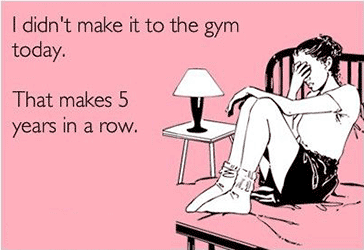 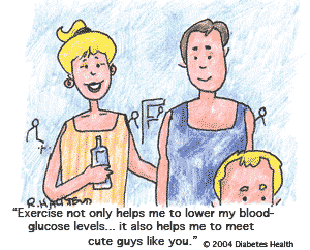
Secondly,
exercise uses up excess glucose in the blood leaving little left over
to set off insulin release that is instrumental in filling fat cells
with the fat particles floating in our blood. Another way to look at
it is, there is less glucose to provoke the release of
insulin. In this way you greatly lower the amount of new
fat that can be formed.
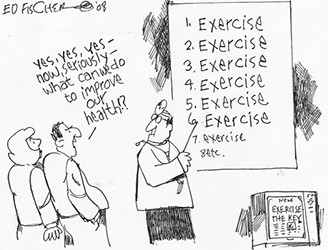 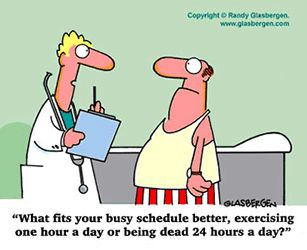
Thirdly,
exercise causes old cells to to be discarded and new cells to form.
Thus our muscles and organs are continually being upgraded and
improved by the very fact that they are being stressed.
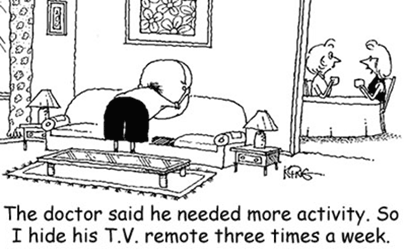 
Fourthly,
exercise prevents muscle cells being stripped and used for fuel along
with glucose and fat. If you fast or eat a dramatic amount less, without
exercising, you will lose muscle mass and end up looking like a human
skeleton. Although this will still happen to some extent, exercise is
the one thing that can put a damper on the conversion of your body mass
into fuel. You
want to store less fat not less muscle.
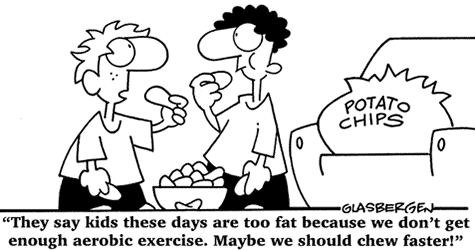 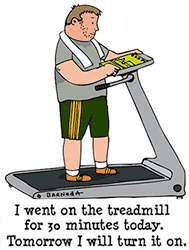
Fifthly
exercise tends to burn fat in and around the muscles that are active.
In his
book "Core Training Anatomy" Frederic Delavier says "Your body stores
fat first on your least active muscles." While it is true that you will
find most fat on the least active muscles, Delavier's statement makes
no evolutionary sense. This site suspects that fat is, in reality,
distributed equally to all muscles. On active muscles it would be burnt
away by the activity of the muscles and converted to energy. This would
leave active muscles only lightly layered with fat. Inactive muscles,
on the other hand, would burn so little fat that the fat would simply
build up and up. This would still explain why our abs and butts tend to
accumulate
lots of fat. However, this does not mean you can get good looking abs
by exercising your abs. Most fat does not come off the muscles being
used. It comes off those places where a lot of fat has built up.
Exercises, that limit themselves to specific
muscle groups are actually burning less fuel than exercises that use
many muscle groups. The more muscles you use in an exercise the more
fat you are likely to use up and it will still tend come off those
places like the abs where fat tends to accumulate. Sixthly
exercise has an important effect on where fat tends to accumulate on
our bodies. People who do not exercise and lead rather inactive lives
tend to build up fat in every part of their bodies where fat can
collect. Some of this fat builds up around our vital organs like our
hearts and basically strangles those organs causing them to malfunction
and fail. If we exercise, however, fat does not build up
deep within but rather just under our skin. We can can actually have
quite a lot of this fat and still be healthy.
 EAT
WHOLE FOODS AND AVOID THE MIDDLE ISLES OF THE
SUPERMARKET. EAT
WHOLE FOODS AND AVOID THE MIDDLE ISLES OF THE
SUPERMARKET.
Whole
foods are fresh produce, usually found around the perimeter of your
supermarket. They are fruit, vegetables, meat and nuts in
their
shells. Basically they are food as it comes in nature with no
processing. It is the food that rots and goes bad quickly so it is
often kept cool or frozen to slow down the rot.
All
biological processes have to be understood in terms of Darwin's theory
of evolution. We are the result of adapting to the food available
before civilization (among other types of adaption). We adapted to this
diet over millions of years till we became perfectly suited to it.
This diet of whole foods is what we are best fitted to eat, and it is
therefore, the most suitable and healthy food we can consume. As
omnivores we are are well adapted to both, what we can gather, and what
we
can hunt down.
Our
bodies use two types of
fuel, fat and glucose. Glucose is extracted from carbohydrates by our
digestive tract. The complex carbohydrates found in most vegetables are
digested slowly, partly because they are complex, and partly because
they
are embedded in fiber which trickles glucose into our blood in a
slow, nice even flow. The simpler carbohydrates (sucrose) found in table sugar, soft drinks, and most processed foods are
far more
easily digested
and enter the blood stream quickly. Fruit has fructose, which is an
even more simple carbohydrate, and as one might expect it is digested
easily. However, in fruit, fructose is surrounded by fiber,
that
slows
down
the digestion, allowing it to enter the liver and be processed into
glycogen or fat in a nice
even way that does not overload the liver. Our bodies still perfectly
process raw fruit and
vegetables in this way and indeed raw meat also.
Although
raw
is still the best and most nutritious way to consume fruit and
vegetables,
we seem to have lost the taste for raw meat. The invention of fire and
cooking made meat a much safer
food by eliminating bacteria and parasites. It did, however, reduce
some of
the vitamins and other food value of meat. Cooking was the first
food process and humans have been adapting to it for a long while as
well. Cooking has been around so long that we have indeed adapted to
it.
Although humans began cooking vegetables as well and lost more
nutrients we adapted to this also.
Then
10,000 years ago humans
invented farming. Farming brought with it many new ways to process and
store food. 10,000 years is a long time and we have adapted fairly well
to the earliest invented processes such as bread and butter. The
older those processes are the more time we have had to adapt to them
and thus the more healthy they are for us to eat. Not only that, but
over 10,000 years we learned as cultures to mix and match foods and
prepare them in ways that were also more healthy. Experimentation over
the 10,000 years, noticing what worked and what did not, produced many
different diets and almost all of them work very well and are
nutritionally ideal for almost all humans.
With
the advent of the enlightenment, and the rise of science, humans began
to
think that they might be able to design better food than what had been
produced by evolution and
10'000 years of cultural wisdom. Unfortunately they were wrong. The
scientists discovered a lot, but by looking for nutrients, (the
chemicals
in food that our bodies needed) they missed the
essential idea,
that what our bodies actually needed was the whole foods.
Scientists
discovered vitamins and minerals that were essential to our wellbeing
causing a whole industry to grow up devoted to producing them in
supplements and reinserting them in various foods. But they did not
work
well in these new refined forms. What the scientists failed to
understand, was that it was the way vitamins and minerals were
embedded in whole foods and how they were mixed with other foods was
what made them work efficiently in our bodies. By taking in these
chemicals in a refined form we were running an experiment on ourselves
that we still do not know the answer to. They may help, but they may
also do nothing or be slowly poisoning us.
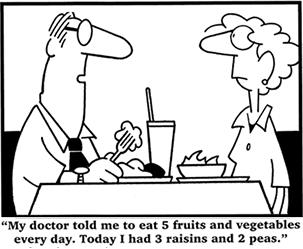 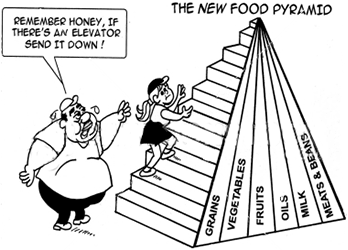
All
processed food has been changed, and we now know that this change is
always for the worse. Most processes for food are to enable storage and
to increase shelf life. One way to increase shelf life is to remove the
fiber, another is to add preservatives such as sugar or salt. Most
processes also, unfortunately, destroy or remove the vitamins and
minerals.
Basically,
we threw out
millions of years of evolutionary adaption, and 10,000 years of
collective wisdom, in favor of cheap, long lasting food that
slowly kills us. Sure, it has been certified not to poison us
immediately,
but we now know it does kill us slowly.
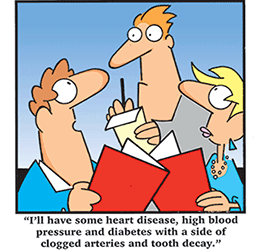
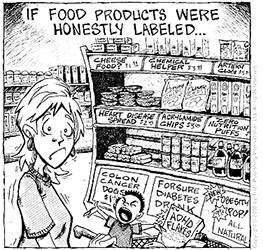
In
most super markets, the
middle isles are where processed foods are stocked. We are, however, better
adapted to some of these processes than others. The length of time the
process has been around is a good indicator of how well we might be
adapted to it. Our bodies should be able to cope with it if it has
stood the test of a significant amount of time.
 AVOID
REFINED SUGAR AS MUCH AS POSSIBLE. AVOID
REFINED SUGAR AS MUCH AS POSSIBLE.
Sucrose
(sugar) is the sweetener that makes everything taste good. Sucrose is
made up of two simple sugars glucose and fructose. Glucose is the main
fuel for our bodies. It floats around in our blood and powers most of
our body's activity and functions. Glucose can be processed by the
mitochondrier in almost every cell of our bodies. Fructose is the part
of sugar that makes food taste sweet and its evolutionary purpose was
to inform us that something was good to eat. Fructose, unfortunately,
cannot be processed everywhere in our bodies, and in fact, can only be
processed in our liver, where all of it is sent.
While
most glucose goes straight into the blood a small amount of it also
goes to the liver. Most of the glucose, that goes to the liver, is
converted into glycogen and is stored there as a kind of fuel buffer. Some glucose is also burnt in the liver's mitochondrier to provide it with energy to enable it to function.
Our muscles also act as a store for glycogen and tend to take in
glucose in response to insulin release. These glycogen stores respond
to the release of glucagon or cortisol to convert glycogen back to glucose thus raising the level of glucose in the blood, as is
necessary when it gets low. Most
of the glucose and fat floating in our blood is there as fuel to supply
us with energy and enable us to thus move and be active. The glucose,
that is not burnt in enabling movement, is mostly burnt in the
mitochondrier of our various bodily organs to provide them with
energy, so they can function.
If
glucose goes into the blood too quickly, the pancreas detects that our
blood glucose is too high and secrets insulin which does two things. It
opens up our fat cells so they
can
absorb the fat floating around in our blood and it also causes our
muscles and liver to take in glucose floating around in our blood and
convert it into glycogen. Too much glucose, too fast, ensures that the
blood is cleared of fat into our fat cells so that most energy has to come from the
burning of glucose. The excess of glucose is converted glycogen or is
converted to fat by the liver. Thus excess glucose makes us fat
instead
of being burnt for energy. Glucose needs to enter our blood in a nice
even trickle over
the length of the day. Only in this way can most glucose
avoid simply making us fat. Sadly refined
sugar digests very quickly, flooding into the blood, spiking blood
glucose, and thus mostly promotes fat production or is stored away.
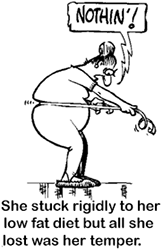
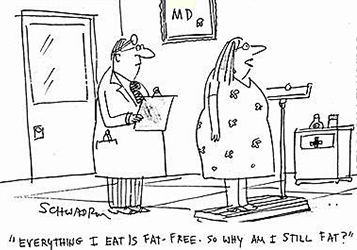
All
fructose goes to the
liver, and when derived from refined
sugar or fruit juice it does so quickly, and thus in large amounts.
If it goes to the liver too quickly, as in these cases, and thus in too
greater amount, the liver tends to be overwhelmed. The liver has to
process all the fructose, but it cannot all be converted to glycogen and
stored.
It is instead, processed in the liver's mitochondrier, where some of it
is converted to energy. However, unless a person is exercising, this
burn is weak and a waste product is formed, which is then converted
into
fat. This fat has to be then expelled from the liver. If this fat
builds up too fast, it can exceed the rate at which the liver is able
to
expel it. It then begins to build up and up, as the liver trys and
fails to expel it fast enough. This liver fat can gradually build up
over time, till it starts to clog the liver and prevent it from
operating properly. When this happens, the liver is sick and we with
it.
But it gets
worse. When the liver fails to thus work properly the pancreas trys to
force
the liver to work by pouring out more insulin. This of course creates
even more fat and does not help the liver as it becomes resistant to
insulin.
Sugars
then, should be seen as a poison when consumed quickly. It is only safe
in whole food, where it is surrounded by enough fiber to ensure that it
only goes into the blood and to the liver very slowly.
Although
the more you
exercise the safer it should be to consume refined sugar, this is not
really the case. Refined sugar is
never really safe because it
is also addictive. It has been shown in many experimental studies to
induce the same craving symptoms as most street drugs where the more
you consume the
more you crave. (It is undoubtedly the sweetness of sugar that we
become addicted to.)
Also,
sugar does not make you feel full no matter how much
you have. That is because it is so easily digested none of it ever reaches the end of the small intestine where the hormone peptide YY (3-36) is secreted that informs us that we are sated. Not only that, but sugar, flooding your blood with glucose,
causes excess insulin release which causes glucose levels to drop too
much,
causing us to actively desire and seek more sweetness and thus more
sugar.
Because
of all this, refined sugar is much more likely to make you fat than fat is.
Almost any food that we eat too much of can make us fat, but whole
foods all
have safety features built in that slows extraction to a slow even trickle, prevents us being hungry, makes us
feel full and make us feel sated. Refined sugar does not have these
safety features.
Sugar
is, unfortunately, liberally and massively pervasive in almost all
packaged food, or processed food, which is to say, all the food
products
in the middle isles of your supermarket. Sugary
drinks, cakes, biscuits, cereals, sweets, sauces etc.
are slowly poisoning us.
In
nature, wherever sugar is found it is very hard to get at. Sugar cane
is
a stick, honey has to be stolen from bees, and fruit is surrounded by
fiber that causes it to digest slowly. We were prepared by evolution to
cope with a lot of sugar, only either once in a blue moon, or have our
bodies
absorb it very very slowly.
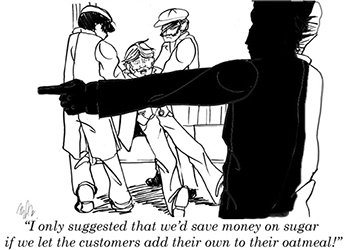 
Humans,
unfortunately being very clever, learned to refine sugar and make it
easily available in massive quantities. We then allowed it to be put in
most of our food. An unfortunate contributer to this situation has
been,
the popularity of, and government/health care experts approval of, the
low fat diet. Most governments forced the big food companies to lower
the fat content of their foods. When they did this it tasted like
cardboard. To improve the taste of their foods and increase its self
life the food industry added sugar. They did this more and more till
the middle
shelves of the supermarkets were riddled with sugar.
 AVOID
SUGARY DRINKS AND
DRINK ONLY A LITTLE
ALCOHOL. AVOID
SUGARY DRINKS AND
DRINK ONLY A LITTLE
ALCOHOL. 
If
any one thing can be said to be responsible for
the current epidemic of obesity, it is the modern habit of drinking
soda,
soft drinks, fruit juice and any other sugary drinks.
In truth, only unadulterated water is truly what
we are fully adapted to drink. Sugary drinks go into our blood as
glucose faster than anything else and overload our livers as well.
While
in the past people drank water, alcohol, tea and coffee they did not
drink the sugar waters of the modern age. A little sugar was added to
tea and coffee but the amount of sugar consumed this way was small because of the expense. Now
sugar comes in everything. Sugar comes in our milk, in our in our soy
milk,
in our electrolyte drinks, and extra in our juice.
While most people are well acquainted with the idea that coke, Gatorade
etc., are bad for them, they are quite often under the delusion that
this does not apply to fruit juice, and that fruit juice is some how
healthy. This is a serious mistake. The juice from fruit has the same
fructose molecule as any other sugary drink. What it does not have is
the fruit's fiber. Without this fiber it is as dangerous as any other
sugar laced drink. If the juice is freshly squeezed it has little or no
fiber. If it comes out of a blender the fiber has been chopped up and
destroyed, indeed, any vitamins that were in the fruit were probably
also
destroyed by the blades of the blender. On the supermarket shelves it
has extra sugar added to preserve it. Fruit juice is just sugar water
without the fiber,
little different from coke.
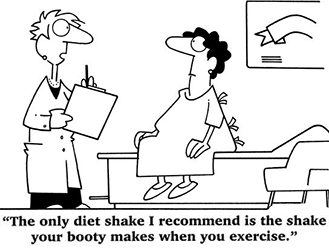
A
personal note: "The
one thing I found, that I could not completely give up, was the sugary
drinks. My solution was to find a drink I liked and then dilute it with
water. The result is a liquid that is 90% added water. This liquid is
hardly sweet at all, but it does stop the craving of sweet drinks."
We
all know that a lot of alcohol is bad for us, not just because it
affects
our brains in bad ways, but also because it can make us fat and
destroys
our health in the same way as does sugar. While a
small
quantity of alcohol is good for us, a lot is bad because it is
processed the same way as fructose. It all goes to the liver to be
processed and it goes there in too large a quantity to quickly. This overloads the liver much the same as
fructose does. Alcohol is a form of carbohydrate, and it it can only be
burnt
in the liver's mitochondrier.
Also, like fructose, it produces a waste product in the burn, which is
then
turned to fat.
 DIET
DRINKS AND ANY SUGAR SUBSTITUTES ALSO CAUSE
YOU TO GET FAT. DIET
DRINKS AND ANY SUGAR SUBSTITUTES ALSO CAUSE
YOU TO GET FAT.
The
function of bodily systems is to maintain a balance, usually a balance
of chemical levels in those bodies. When we move glucose is burnt creating energy and the the insulin levels in
our bodies drops. Also another hormone called glucagon is secreted by the pancreas if the
amounts of
glucose, LDLs or triglycerides gets too low which has the opposite
affect causing fat cells, to release fat back into the blood and causes
glycogen
to be converted back into glucose and released back into the blood. This insures that very little of blood glucose is
being absorbed by our muscles and liver so that there is plenty of glucose available to be
converted into energy. This system, not only reacts when we begin to
move, but also before we begin to move. Our bodies anticipate that we
are going to move. This is a process our bodies learn over time. Our
bodies detect certain bodily changes that precede action or effort each
time, and use these to release the hormone cortisol in anticipation that
action or effort will follow again. In much the same way
insulin levels tend to go up automatically at meal times, because our
bodies have learned that there will be a glucose and fat influx at
those times of day and cues that proceed meals. Regularly scheduled, orderly activities, allow
bodies
to more easily remain chemically balanced. Sudden, unexpected and
large influxes of some substances, can throw our systems and body
chemicals out of balance. For instance, the liver stores glucose in the
form of glycogen. The liver and muscle tissue react to drops in
blood glucose levels with the secretion of glucagon and prepares for intense activity with the secretion of cortisol. Both of these hormones stimulate the conversion of glycogen back
into glucose, and the release of it into the blood to restore blood
glucose levels to their normal balanced state or boost it in preparation of intense activity. The liver and muscle tissue not only replace glucose that has been burnt for energy, but
also anticipates such short falls increasing glucose levels before they
begin to fall.
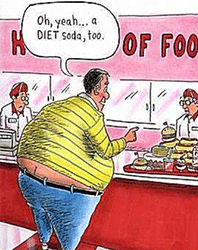

It
follows from this, that the mere taste of sugar, can and will
cause our bodies to react by making us fat. Our bodies do this because
they anticipate an influx of glucose. In other words we do not
have to swallow and process sugar for it to make us fat, the mere taste
of sugar may make us fat. This makes sugar substitutes likely useless
and even counterproductive. When we taste something sweet it is
normally the fructose that we are
tasting. In all probability, our bodies have learned over
time that the sweet taste of fructose in our mouths is
normally followed by a load
of glucose flooding our system. It follows then, that when we taste
sweetness our brains send some kind of chemical signal to our pancreas
to release insulin or maybe the sugar is tasted in our small intestines
causing insulin release. IN any case this insulin causes our blood to
be swept clean of
large amounts of both fat and glucose. In turn this reduction in body
fuel prepares
our bodies for, or anticipates an influx of new glucose. In this case
the
glucose never arrives. Low glucose levels make us crave more sweetness.
This starts the cycle over again. So it is, the mere taste of
sugar will cause
fat to form. Sorry, its not the number of calories that are important.
Its the imbalances in the system that are important.

A University of Texas Health Science Center study
found that the more diet sodas a person drank, the greater their risk
of becoming overweight. Downing just two or more cans a day increased
waistlines by 500%. Why? Artificial sweeteners can disrupt the body's
natural ability to regulate calorie intake based on the sweetness of
foods, suggested an animal study from Purdue University. That means
people who consume diet foods might be more likely to overeat, because
their body is being tricked into thinking it's eating sugar. This in
turn causes low blood glucose and a
craving for more sugar.
A separate study found that even just one diet
soda a day is linked to a 34% higher risk of metabolic syndrome, the
group of symptoms including belly fat and high cholesterol that puts
you at risk for heart disease.
When
a body is tricked into lowering its own glucose levels, balance has to
be restored. One has to ask then, what
happens if no sugar arrives as expected. Obviously it leaves the body
with low blood glucose and low energy. This in turn makes us very
hungry and causes us to crave more sweetness. As long as we don’t eat or
drink more sugar this may not be overly dangerous but this is not what
usually happens. One assumes the liver and muscles would eventually be
signaled that the blood sugar is low, and they would restore
balance by using their glycogen storage to restore blood glucose to
normal levels. The use of sugar substitutes, then, may cause this up
and
down
of blood glucose until such time as the body eventually relearns that
the taste of sugar does not indicate incoming sugar and stop
anticipating. This may still greatly increase the likelihood of metabolic syndrome despite the lack of calories.
 DO
NOT EAT FAST FOODS. DO
NOT EAT FAST FOODS.
We
are fairly well aware that fast food is bad for us, but it is important
to understand why and how it is unhealthy. It has a lot of fat in it
but that is not an important reason. The whole idea of fast food is
wrong because it is fast. It comes fast, no waiting for your food. You
can eat it fast and you are encouraged to do so. All this
leads to
glucose spikes in your blood and the inevitable fat it produces.
Another good reason is all the refined sugar in fast foods. There are
the sugary drinks, the sugary sauces, sugary deserts etc. etc.. This
results in more
glucose spikes and fat. Also all the fiber is removed from fast foods
so it will keep, causing even more glucose spikes and fat. Remember all this sweetness makes fast food very addictive.
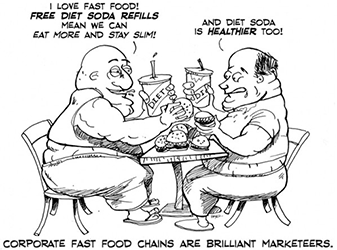 
The
only significant vegetable you get with most fast food is the fries. The
potato has very little fiber for a vegetable and masses of
carbohydrate, which is not very complex, (basically starch) so it digests quickly and
enters our blood as glucose quickly, especially when fried. The burger
bun is the worst form of fiber less bread. Bread, of
course, is almost pure starch and is normally made with
little or no fiber. In this case all the wheat fiber has been removed.
Consequently, the glucose from a burger bun enters our blood
even faster. This is why these two foods are so fattening and why they
are
bad for your health if you have too much of them.
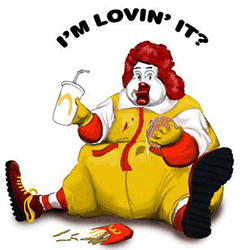
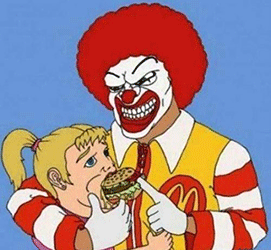
All this sounds bad,
however, eating fast food once a year or even once a month probably won't harm
you much.
What is really bad is eating fast food on a regular basis where your
body
has no way or time in which to recover. Unfortunately, fast food is
both
convenient, somewhat addictive, and the fast food companies do
everything they can to keep you coming back as often as is possible. It
is best to just avoid them and never start the addiction.
 SLOW
DOWN YOUR FOOD INTAKE. SLOW
DOWN YOUR FOOD INTAKE.
Modern
man is ever in a hurry, but we now know that we are not well adapted to
eating fast. Eating quickly means that food goes into our system
quickly, and for carbohydrates this means glucose spikes which creates fat.
Rapid
eaters are often heavier than slow eaters, according to research from
The University of Rhode Island. It takes 20 minutes for your stomach to
send a message to your brain that you have eaten enough and are
satisfied. If you rush your meal and eat rapidly, your body's satiety
cues won't be tuned in to those feelings of fullness yet and it's
easier to overeat. Try slowing down by chewing each bite at least 10
times, putting your fork down in between bites, and fostering a
relaxing eating environment rather than eating on the run.
There are many ways to slow
down your intake of
food. Talking while you eat and drinking while you
eat also slows down food consumption. Water
is essential for keeping the body hydrated and we're actually more
likely to retain "water weight" by not drinking enough of it rather
than by having too much. The needs of each person will be different,
but the general recommended daily amount is 64 ounces. It also takes up
space in your stomach so you'll feel fuller while taking in less
calories.
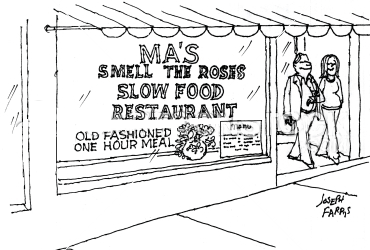
Obviously you can simply eat
slowly, however, chewing takes time so chewing also forces you to eat
slowly. Chewing can also act as a reminder to slow down, savor and chew
consciously which may help you realize you’re fuller sooner than you
thought you’d be and then wind up eating less!
(However this suggestion is not meant implemented as a diet. Like most
of these suggestions it is meant to be used sparingly and carefully. It
should be understood that chewing too much can be dangerous. It tends
to make eating unpleasant and can cause the hormone that tells us to
stop eating to activate far too soon causing us to loose weight far too
quickly and in too large an amount. It also causes stomach acid to build
in anticipation of having to deal with difficult to digest food which
is not the case. Thus it can cause all kinds of stomach problems and
indigestion.)
Also using chopsticks requires
a bit more attention in picking up food from the plate. The portions
are smaller, and eating with them takes more time because you have to
closely watch each bite so the food doesn’t fall off. Another way to
slow down is grazing. This is eating tiny amounts of food whenever you
feel hungry and having no main meals at all. (This also has a few problems
as it makes it very easy to eat the wrong kinds of food but is
effective if done right.)
People
who ate a low-calorie vegetable soup before
a meal consumed 20% fewer calories at the meal, according to research
from Penn State University. Have a low-calorie broth-based veggie soup
before your largest meal of the day to reduce calories and lose weight
without feeling hungry.
If
you just have to eat sweets or cakes the following may help you slip
away from the habit and reverse and rectify the bad effects it can
have.
Portion out one serving of
your favorite treat, taking a minute to smell it, look at it, and think
about it. Take one small bite. Chew slowly, moving it around your mouth
and focusing on the texture and taste, then swallow. Ask yourself
whether you want another bite or if that one satisfied you. If you
still want more, repeat, this time chewing the food 20 times. Continue
this eating exercise for as long as you want or until you finish the
serving (it should take about 10 minutes). These suggestions
come from results found in an experiment conducted by Lesley Lutes,
PhD, an
associate professor in the department of psychology at East Carolina
University. She says: "When you take the time to slow down and be more
mindful of what something really tastes like, you'll feel more
satisfied,". "Many of our participants told us that after a while,
they didn't enjoy the treat as much as they thought they would, or they
were content after just a couple of bites and were better able to stop
eating when they were satisfied." (Note the previous warning about chewing.)
 EAT
FRUIT OR NUTS BEFORE MEALS. EAT
FRUIT OR NUTS BEFORE MEALS.
What
mother said about spoiling your meal was right. You can spoil your meal
by snacking before a meal. But you can also make this work for
you by snacking on the right types of food. By snacking on food
that digests slowly we make sure it goes into our
blood and to our livers in a nice even steady stream. When you snack on healthy food a
little before a meal you can reduce your hunger so you eat a lot less
during the meal.
Fruit and nuts make the best kind
of healthy snacks because they are tasty and satisfying. They may cost
a little more than cakes or biscuits but they put glucose in your blood
much more slowly and are therefor much better for you. Remember, nuts
are far
less healthy when covered with salt or sugar or smoked. Nuts in their
shells are the best way to buy them and breaking each shell also slows
down
your eating.
 TAKE
CONTROL OF YOUR BODY'S FOOD CONTROL SIGNALS. TAKE
CONTROL OF YOUR BODY'S FOOD CONTROL SIGNALS.
Chemicals
that are secreted by various organs in
our bodies tell us
how we feel and what to do. They in turn are controlled by electrical
signals
from our brains when these signals are activated or not activated in
response to external events. Our decisions to circumvent these
promptings are an uphill battle, because they are are attempting to go
against processes that are automatic. Four of these
chemicals, ghrelin,
leptin, peptide YY (3-36) and cortisol are
important to how food is processed in our bodies.
Ghrelin.
Our stomachs secrete a hormone
called ghrelin, which controls hunger and drives our appetite. The
secretion of ghrelin is really just informing us that it is time to
put more fuel in our bodies, so that our bodies can function.
Obviously,
this signal is only concerned with the time since we last had food in
our stomachs, and does not concern itself with the amount of
extra fuel we are carrying around in the form of fat. So this signal
can deceive us into believing we need more fuel when that is not the
case.
Even
the most motivated and focused dieter will struggle to be successful at
weight loss once hunger takes over. If we
don't understand, monitor, and control our ghrelin, we can forget about
losing weight. Science tells us that the best way to control ghrelin is
to eat small, balanced meals about every 3 hours or so. That's because
ghrelin will spike after about 3 to 4 hours of fasting, so eating with
regularity helps keep this eating trigger at bay. Unfortunately this is
not practical in modern western society but snacking every three to
four hours is. Two main meals with snacks in between can lower your
hunger considerably. If the snacks are healthy fiberus foods this will
help you
lose
weight.
Leptin.
Our fat cells secrete a hormone
called leptin. It circulates in the bloodstream and is detected in the
brain by the hypothalamus. The hypothalamus uses lepton level to
determine whether our
bodies are in a state of energy or fuel surplus or energy or fuel
deficiency. So, when our fat cells fill up they should secret more
leptin, and our hypothalamus should determine that we feel full and do
not require more food. Unfortunately, insulin is also detected by the
hypothalamus for much the same purpose. High amounts of insulin in the
blood actually block the hypothalamus detecting leptin (leptin
resistance).
Leptin
also acts on the brain in another way. The ventral tegmental area
detects leptin and reduces the reward provided by food accordingly by
suppressing the release of dopamine. Dopamine in this case allows the
pleasure center of the brain to be activated. The pleasure provided by
food should drop the more we eat and the more fat on our bodies.
Unfortunately, it is insulin's job in the brain to clear this dopamine.
If insulin does not do this, the dopamine builds up and the pleasure
provided by
food increases. Insulin resistance again stops leptin from doing its
job (leptin resistance). The result, we eat more and get fatter.
So
leptin failure or resistance leads to both a feeling of starvation and
increased pleasure from the taste of food. This is a kind of double
whammy for dieters. The combination of a starvation feeling and
increased pleasure from food is almost irresistible for dieters. The
trick, of course, is to get our insulin down. If we do that leptin
resistance disappears. So what causes our insulin to go up? The answer
is glucose going into blood too fast. What brings insulin down? Answer,
when
our energy expenditure matches the glucose going into the blood. And
how
do we get this evenness of energy use and glucose levels? We get it by
eating foods that convert to blood glucose slowly over long periods of
time
(food with fiber). Or we can simply burn the glucose by exercising more.
Peptide
YY (3-36). Peptide YY (3-36) tells us that we are sated. Ghrelin not being secreted
tells us we are no longer hungry, but does not stop us from
eating. We don't eat only because we are hungry. We keep on eating even though
we are not hungry. We finish what is on our plate. If there is food we
can help ourselves from in the center of the table we will eat more.
People always eat more when they they go to a 'one price as much as you
want buffet'. But our
bodies do get a signal to stop eating eventually. This signal hormone
has the chemical name peptide YY (3-36) and
is the signal for satiety. It turns off our desire to eat.
Unfortunately,
peptide YY (3-36) is secreted by cells at
the end of the small intestine and the beginning of the colon. Between
the stomach and these cells, there is twenty two feet of small
intestine,
and it normally takes about twenty minutes for food to reach those
cells, after you start to eat.
There
are, however, a number of things we can do to facilitate this hormone
in being
active and prevent us eating too much. Firstly, we can eat foods that
have soluble fiber with each meal. Soluble fiber hastens food on its
way
through the small intestine shrinking the time it takes to reach these
cells. Secondly, we can refrain from putting serving food on the table
so
limiting the the cues or temptation to have seconds. Similarly and
thirdly, we can
determine that food servings be smaller and served on smaller plates.
Finally, we can put off having that second helping until 20 or so
minutes are up. If we do this we will find we are no longer interested
in food.
Cortisol.
The hormone cortisol
has many functions for our bodies, but its main function is to
orientate
the body for action. It speeds up many bodily processes. It makes us
alert. It prevents muscle and bone repair so that they are fully
prepared to
be active. It increases blood glucose levels by causing glycogen to be
broken down in the muscles and liver and released back into our blood.
It prepares us for
expending large amounts of energy, and it works to do so in
concert
with the release of adrenaline. Cortisol is called the stress hormone
as
it prepares us to deal with stress. For short term stress it is the
ideal pick me up. Chronic stress of modern life, however, make it
something of a poison that causes our muscles and bones to be unable to
repair themselves. It keeps our blood glucose too high which causes
increased insulin release and eventual insulin resistance and thus the
inevitable increase in fat. It also increases hunger and causes
stress eating. Worry is the big stressor in modern life, and unlike
short term stress it it does not go away after a while.
Surprisingly,
there is a simple, cheap and effective way to lower your cortisol:
exercise. Although exercise raises your cortisol while you are doing it
(to mobilize glucose and free fatty acids for energy) it reduces
cortisol levels for the rest of the day. It also burns off fat in your
muscles to improve insulin sensitivity and and in your liver to to
improve heptic insulin sensitivity.
Summary.
To lose weight and live a healthy life the
information presented on this page appears to be the
current state of thought in the sciences of food, health
and weight loss. So let us summarize what we have learned:
-
FAST.
Fasting is essential to weight loss and bodily health. When performed daily it allows the glycogen
in our livers to be depleted and fat to be released from fat cells to be burned for energy.
-
EXERCISE.
Exercise enables health by ensuring all our bodily processes are fully
functioning. It also prevents the creation of new fat by converting the
glucose in our blood into energy.
-
EAT
WHOLE FOODS. Processed foods lack vitamins and put glucose in our
blood too quickly ensuring its conversion to fat. Every part of food is what
makes it good for our health.
-
AVOID SUGAR. Refined
sugar is an unhealthy concentrate that floods our blood with
glucose ensuring its conversion
to fat. It also causes massive fat production in our livers.
-
AVOID
SUGARY
DRINKS. The only time it is quite safe to drink refined sugar is just
before or just after exercise when glucose levels are about to drop or
have already dropped.
-
AVOID
SUGAR
SUBSTITUTES. Our bodies anticipate incoming sugar by means of the taste
and
begins storing fat in preparation. So we still get fat.
-
AVOID
FAST
FOODS. Fast food is bad both because it's fast and also
because it
floods our blood with glucose ensuring its conversion to fat instead of
energy.
-
EAT
SLOWLY. Slow eating means better digestion and slower intake of fat and
glucose. This slower consumption means better health and less fat
formation.
-
EAT
FRUIT OR NUTS BEFORE MEALS. To lose weight we should eat less. To do this we can spoil our meals with
food
that digests slowly but moves through our digestive tract
quickly.
-
CONTROL YOUR BODY'S CHEMICALS. These
signals can be controlled by eating
slowly,
regularly, and with lots of fiber and of course exercise.
The above suggestions are, current as of the 1st of January 2014.
|





